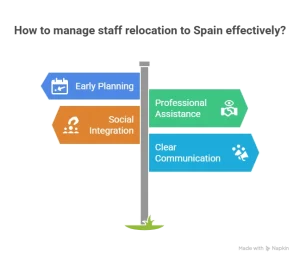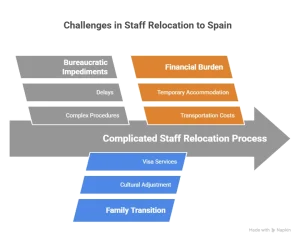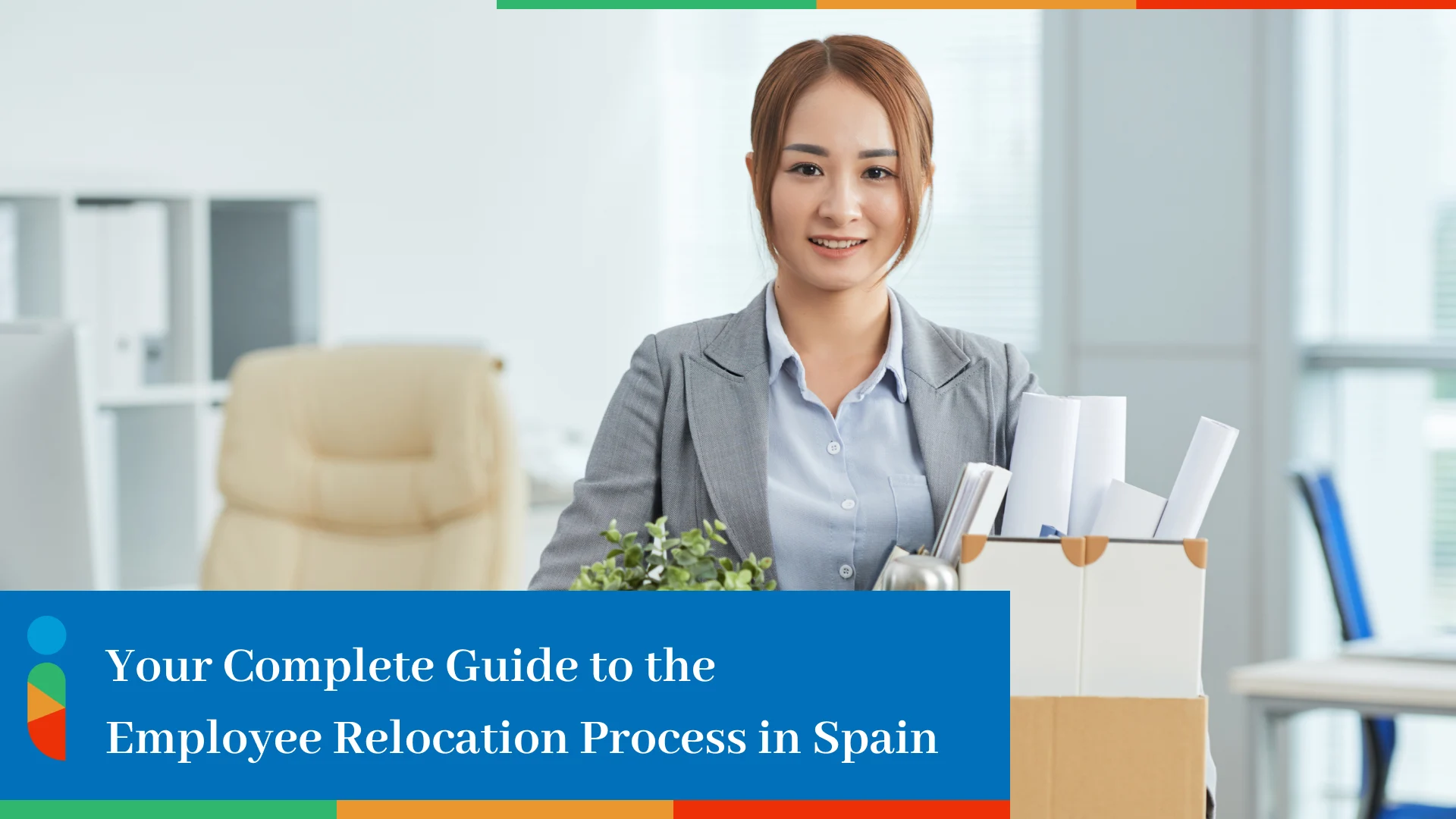Do you consider moving to Spain or hiring top personnel from there? Moving employees might feel like they are in a maze, especially when they are moving to another country. This article guide is the most important detail you need for the employee relocation process.
We break down every step of the staff transfer to Spain for HR managers and worldwide expansion teams. We cover everything from applying for a visa and dealing with immigration problems to taxes and social security.
Find out important information about legal requirements, cultural integration, and practical concerns to make sure your important personnel have a smooth transition. Don’t let complicated Spanish laws get in the way of your worldwide goals – give your team the tools they need to succeed.
What Is the Employee Transfer Process in Spain?
The organized process of shifting a worker to a new work site is called the employee transfer process. It includes logistical, financial, and human support. It’s important for global growth, addressing skill shortages, and keeping talent in modern workforce planning.
A well-planned move keeps the business running, enhances employee morale, and in the end, helps the organization be more flexible and thrive.
Relocating Employees to Spain Doesn’t Have to Be Complex – Our Experts Handle Compliance, Visas, and Payroll for You
Definition and Scope of Employee Relocation Process in Spain
The employee relocation procedure is a structured help that Spain offers to migrate employees to a new job site, whether it’s inside the same city or across regions or even across borders.
It encompasses everything from transportation and legal issues to financial help and cultural adjustment, making sure that the transfer goes smoothly no matter how far it is. International shifts are the most complicated because there are so many rules to follow.
General Workers’ Relocation Scenarios in Spain
There are several reasons why businesses need to relocate employees, and it’s important to understand how employee relocation works in Spain.
Opening new offices or moving into new markets requires key staff to set up operations, filling important skill gaps where local expertise is limited; advancement or career development opportunities require a shift, and company mergers bring teams together.
Sometimes, employees ask to move for personal reasons, and organizations may agree to this to keep good staff.
Key Scenario is Business Expansion:
The employee relocation process in Spain is a critical component of growing a firm. By strategically placing experienced staff, assuring continuity, and cultivating company culture from the start, businesses can open new offices or penetrate new markets. It is very important for global expansion to work.
Specialized Roles for Project-Specific Needs:
Employees often move to new locations because of project-specific needs, particularly when performing specialized tasks. To start important projects, companies shift professionals to new places to make sure the relevant capabilities are on hand for effective completion and on-time delivery.
Employee-Requested Transfers:
When an employee asks to be transferred for personal reasons, such as family demands, a spouse’s new work, or a desire for a different lifestyle, that’s called a worker-requested transfer. To keep good employees, companies may assist with this.
Skill Gap Fulfillment:
When there isn’t enough local talent, people move to fill skill gaps. Companies move personnel with specialized skills to new locations to make sure that important roles are filled and projects remain on track.
Understanding the Staff Relocation Process in Spain
Moving employees to Spain is a complicated process that includes constitutional, logistical, and cultural steps. To avoid penalties, it is very important to have a well-organized approach that follows the Spanish visa, labor, and tax rules.
Most importantly, it makes it easier for the employee and their family to fit in, which helps them do well in their new home.

Why Relocate Workers to Spain?
There are numerous positive reasons for employees to move to Spain. Companies may reach more people by being able to conduct business in the EU, and they can grow even more by having strong relationships with Latin America.
It is an appealing commercial hub because it has a qualified workforce in growing areas, the government encourages international investment, and visa processes are quick and easy.
Also, Spain’s outstanding quality of life, including its weather, culture, medical care, and work-life balance, makes staff members more likely to stay.
Spain’s Talent Market Moves Fast – Relocate Your Employees Before Opportunities Slip Away
Business Expansion and Talent Deployment
Companies can reach new markets and find competent workers by tactically expanding into Spain. Moving experienced employees to new locations ensures continuity, integrates business culture, and provides crucial leadership to set up new operations successfully, using their skills to enter new markets and obtain future success.
Staff-Requested Transfers to Spain
Individuals who ask to be transferred to Spain often do so for personal reasons. Workers look for new experiences, a better way of life, or to be closer to family. People who want to combine a job with starting their own business may also be drawn to Spain because of its dual work prospects.
Best Practices to Manage Staff Relocation Process in Spain
Early planning, professional and legal assistance, social integration, and clear communication are the best practices to handle the workers’ transition process in Spain.

Assessment Before Moving to Spain
It’s essential to assess the employee’s needs, family requirements, and how they can adjust to the new circumstances. This pre-moving assessment helps to make the transition smooth and easy for employees and companies.
Personalized Relocation
The specific roles and position-based allowances and benefits meet the employee needs and demands individually, aligning with standard employee benefits offered across the sector.
Regular Checks and Feedback
After staff relocation, regular checks and employee feedback are essential to resolve issues and employee concerns and maintain the workplace environment in the new region.
Employee Relocation Alternatives
Not all jobs require you to move to a new place. Spain’s flexible employment regulations let businesses look into remote work or use Employer of Record and PEOs to hire people without having to move them completely.
EOR in Spain
An employer of record in Spain can let companies hire people without having to move them completely. By signing an EOR contract, firms can hire people in Spain legally and handle payroll, taxes, and HR without having to set up a local corporation.
Don’t Require Full Relocation
If you want to test out new markets, hire specialist workers quickly, or if your Spanish business doesn’t need a full organization, an Employer of Record model or remote work is the best way to go. It gives you mobility without a huge setup.
Common Issues in the Staff Moving Process in Spain
The staff relocation process is complicated from one country to another. Companies must consider legal advisory services for various aspects to ensure a smooth transition of their workforce and adjustments to the social and cultural landscape in Spain.

Bureaucratic Impediments
To avoid bureaucratic complexities and delays, it’s better to plan every step for the employee relocation process and all registration and administration procedures for various phases.
Family Transition and Adjustment
Employees who relocate to the new country will face difficulties with family transition and their adjustment to the culture and traditions. They usually need professional support with employment visa services in Spain to ensure a smooth settlement with their family.
Finance and Budgeting for Relocation
Employees need to pay for additional expenses when they move to a new country, such as temporary accommodation, transportation, and advance payments.
These additional costs can give you more stress and burden. It’s wise to prepare for all additional expenses to avoid an uncertain financial burden.
Simplified Staff Relocation Process in Spain: Primary Aspects and Considerations
The employee relocation service in Spain has main aspects to consider before proceeding, which are transparent rules and clear goals, benefits, support, requirements, and clear communication.
Staff Relocation Crucial Regulations
You must know the employee moving regulations before the move. What are the common grounds to get support and benefits for moving? Is there any refund policy for early departures from the country?
Interaction and Agreements
Transparent communication and interaction are essential to understanding the legal framework. Detailed documentation, including the necessary employee documents, and the employee shifting contract must declare all the expected responsibilities, duties, deadlines, and required support. It is essential to ensure the relocation process is simple and easy for the staff and the firm itself.
Third-Party or Organizational Internal Assistance
Organizations can offer internal support or employ third-party HR services in Spain for employee relocation. The outsourcing helps the firms to understand local regulations and landscape without hazards.
Wrapping Up
Getting the employee relocation process in Spain depends on careful planning, adhering to all local rules, and having policies that really place employees beforehand. A smooth experience lowers stress, raises morale, and keeps the business running.
Iberia EOR offers full support to help you deal with these problems, making it easier to move staff from other countries to Spain.
Overcome Cultural, Legal, and Administrative Challenges with Our Proven Process
FAQs
How Much Time Is Needed to Relocate the Staff to Spain?
It takes a minimum of three months to a maximum of six months for transition. However, it takes more time to settle into the new circumstances. It also depends on the employee’s nationality, visa category, and position.
What Costs Are Normally Included in A Moving Package to Spain?
Shifting packages to Spain usually includes help with packing, shipping, insurance, temporary accommodation, flights, and getting a visa or immigration help. Several offer help with finding a home, a one-time payment for extra fees, and family support.
What Paperwork Do You Need to Move Employees to Spain?
When moving employees to Spain, they need to have an identification number, a valid visa, a residency permit, a signed job agreement, evidence of Social Security authorization, and sometimes even a criminal record and health records.
Instead of Moving Employees, Can Businesses Use an EOR in Spain?
Yes, corporations in Spain can use an Employer of Record instead of moving all of their employees. An EOR lets companies hire people in Spain legally without having to set up a local firm. They can also handle payroll, taxes in Spain, and HR compliance from anywhere.





